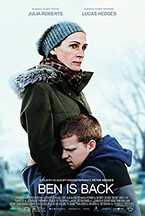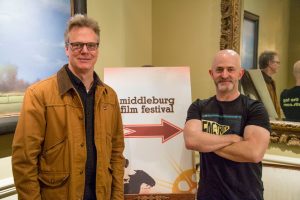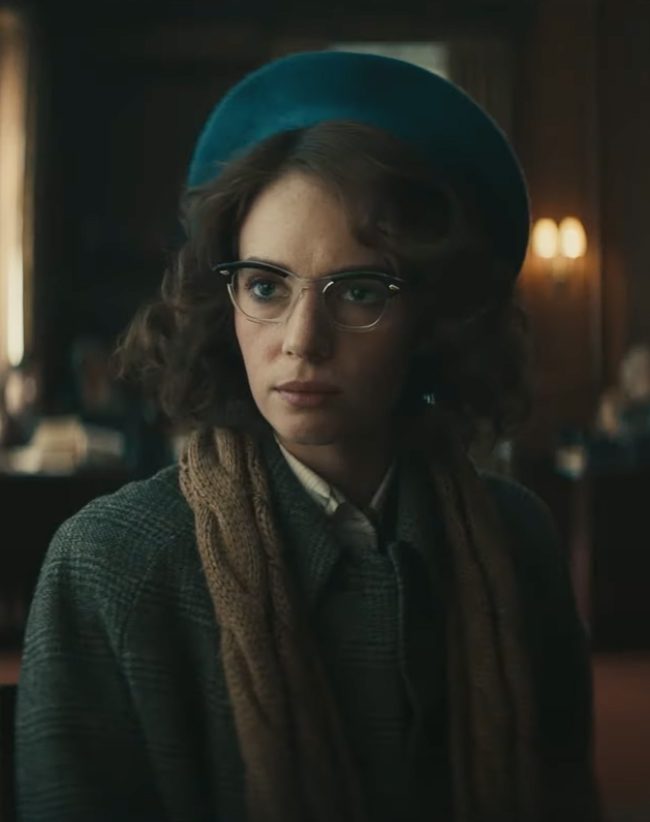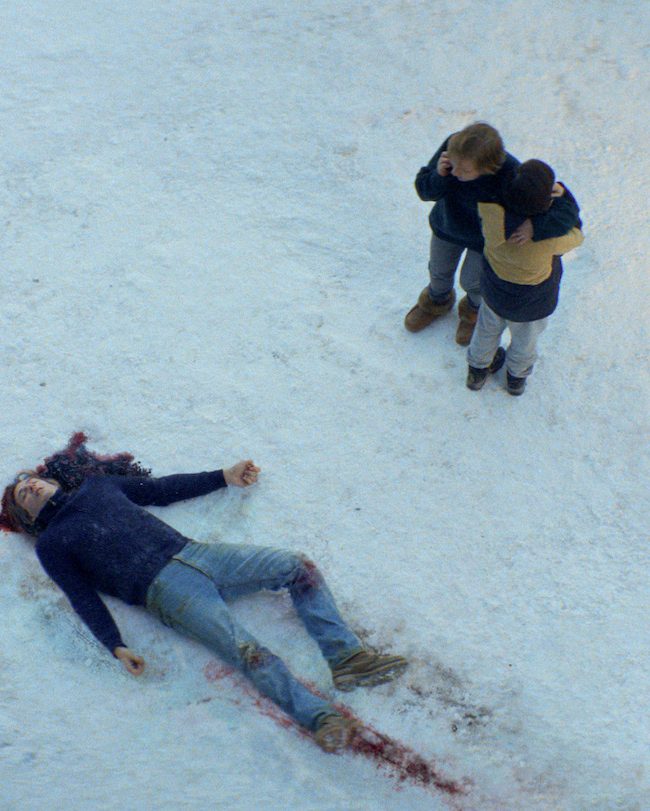A Conversation with Peter Hedges (BEN IS BACK)
 I met with writer/director Peter Hedges (Dan in Real Life) on Saturday, October 20, 2018, at the Middleburg Film Festival, to discuss his latest film, Ben Is Back (which I also reviewed). It tells the hard-hitting tale of a young drug addict who can’t escape his troubled past, even on what should be a sweet visit home over Christmas. Julia Roberts (Wonder) and Lucas Hedges (Manchester by the Sea) star as mother and son in this constantly gripping drama about a problem very much on our nation’s mind, at present. Lucas Hedges is not only a fine actor, but also the director’s son. Here is a condensed digest of our conversation, edited for length and clarity.
I met with writer/director Peter Hedges (Dan in Real Life) on Saturday, October 20, 2018, at the Middleburg Film Festival, to discuss his latest film, Ben Is Back (which I also reviewed). It tells the hard-hitting tale of a young drug addict who can’t escape his troubled past, even on what should be a sweet visit home over Christmas. Julia Roberts (Wonder) and Lucas Hedges (Manchester by the Sea) star as mother and son in this constantly gripping drama about a problem very much on our nation’s mind, at present. Lucas Hedges is not only a fine actor, but also the director’s son. Here is a condensed digest of our conversation, edited for length and clarity.
Hammer to Nail: Let me just start out by saying I’m a big fan of two of the three prior films you’ve directed. I haven’t seen The Odd Life of Timothy Green, but I really liked Pieces of April and Dan in Real Life. I found Dan in Real Life such a sweet variation on the tired romantic comedy genre…let’s call it a romantic dramedy. It was just lovely, and I thought Steve Carell gave one of his best performances, as did Juliette Binoche. It was a really wonderful film.
Peter Hedges: Thank you.
HtN: So, let’s talk first, then, about your career prior to directing. You started out as a writer and you wrote the novel that What’s Eating Gilbert Grape? is based on, and then you were a screenwriter. How did that lead into directing?
PH: Well, I trained as an actor and I went to drama school and then in drama school, it seemed the harder I worked, the better everyone else got, so I started actually writing plays for my friends to be in and I produced them. And I did that for a number of years, from about age 21 to 27. I wrote 12 plays during that time and produced them all in New York. While I was doing that, I started to write what I thought was a play that turned into a novel, What’s Eating Gilbert Grape? And then Lasse Halstrom read that book and asked me what I wanted to do in life. I said, “Well, I really want to write and direct films.” And he said, “Well, if you will adapt this novel, I’ll give you your film-school experience.”
So, for a year, I worked with him on getting Gilbert Grape made and that was, in many respects, my first year and second year and maybe half of my third year of film school. I learned a lot. And after that, I was 30 years old and I finally was making enough of a living that I could marry the love of my life and we started our family. And all through my thirties, I was trying to find that story that I could direct and, finally, I wrote something, when I was 40, and got to direct for the first time, which was Pieces of April.
HtN: And that was produced as part of InDiGent, which, at that time, was trying to promote ultra-indie films shot on MiniDV.
PH: Yes, it was shot on a Sony PD150, which was not even high-def. It was, you know, inspired by the Dogme 95 gang. Gary Winick and his team came up with this concept through working with IFC to finance films and shoot them. Ethan Hawke directed one…
HtN: Chelsea Walls.
PH: Yeah. Did Richard Linklater do one?
HtN: I’m not sure (Editors note: He did, Tape.)
PH: Rebecca Miller did a beautiful film, Personal Velocity. Gary did Tadpole. As I was trying to get Pieces of April set up he kept trying to get me to make an InDiGent film. Pieces of April set up and fell apart three times and then in the final incarnation, just as a Hail Mary pass, I sent it to Gary and said, “This may be a little bigger in terms of cast and locations than you normally do.” And they read it right away and that’s how we made it.
HtN: I was paying attention to this because I had just come out of film school at that time. The camera that you used gave me inspiration that you could make a film with nothing more than a PD-150.

Peter Hedges speaking at the Middleburg Film Festival
PH: My whole idea of film changed when I saw Thomas Vinterberg’s The Celebration. I think the camera they used makes the PD-150 look like the finest camera ever made. I learned from that film that if you have a very good script – and I think the script for The Celebration‘s a great script – so much is possible. So, The Celebration was that for me and I’m still trying to make a movie that good and will probably spend my whole life chasing that film.
HtN: Well, I think you’ve made some very good films, so…
PH: I’m not…I’m so proud of what I’ve done, and I love how I’ve made the films I’ve made with the people I’ve made, but I think it’s really healthy to have models of possibility…one’s Mount Rushmore of film. What’s yours? What’s mine? And those films just keep us reaching.
HtN: An actress from The Celebration, Paprika Steen, just directed a dysfunctional family drama set at Christmas called That Time of Year, which I saw in Toronto. I interviewed her about the film. You might be interested in checking it out.
PH: Oh, I’m so interested in checking it out and meeting her one day. She’s so interesting.
HtN: She was wonderful to meet. So, this is only your fourth feature as a director. Have you just been particularly selective? Has it been tough getting financing for your kind of films? I would love to see more from you.
PH: It’s a great question. I was raising and providing for two young children who are now adults and launched in the world, and I feel that if all goes well you’ll see more films now. I’ll be on a different kind of release pattern. Because I realized, when I started to look at my career, the things I’ve written that were the most personal are the things I’m most proud of, which are Ben Is Back and What’s Eating Gilbert Grape? and Pieces of April. I took a long look at myself in the last year and said “What can I do to make more work like that? How can I spend the rest of my life doing that kind of work?” One time I spent 4 years trying to adapt someone else’s novel and I thought it was going to get made and it kept not happening. I spent two years trying to turn Pinocchio into a little girl for Disney because I thought that could be really neat, and while I learned a lot writing it it just didn’t happen. But now I’m hoping to have a Hal Ashby-like decade, where I make like four or five films that are very personal.
HtN: I can’t wait to see all those films. That’s a great comparison, by the way, and there’s a great documentary about Hal Ashby out right now.
PH: Oh, can’t wait to see it. (laughs)
HtN: So, could you talk about the motivation for telling the story of this new film?
PH: So, my favorite actor ever had just died, a good friend had died, and a family member nearly died. I come from a family rocked and riddled by and from addiction. You can’t open a newspaper or turn on the news or drive through any town in this country and not see the debilitating impact of opioids and heroine. It’s an epidemic and we’re not talking enough about it or doing enough about it and I felt like with my skill set I could tell a story about one family over the course of one day and that, in doing that, if I did that as truthfully as I could, as fearlessly as I could, maybe I would help shine light on aspects of this epidemic that maybe people haven’t seen before, or show it in a new way. I certainly learned a lot researching and writing this film. I feel changed by it. Whenever I make a film, I say to myself, “I hope I’m a different person when I’m done having made this film than I was before I made it.” And never has that been more true than with Ben Is Back.
HtN: Who is that favorite actor of yours who died, if you don’t mind me asking?
PH: Philip Seymour Hoffman. Heath Ledger was pretty high up there, and I could not listen to Prince’s music enough, so on it goes.

Peter Hedges and our Chris Reed
HtN: Well, the film does feel very personal, and not just because your son, Lucas Hedges, is playing in it. So, that’s a segue into the casting. When did you decide to go for Julia Roberts and then can you tell how we got from there to Lucas?
PH: Sure. I wrote the script over the course of last spring, into the summer, and sent it to Julia Roberts’ agent who recommended Julia read it. She read it and I went to meet with her. I came armed with a list of young men who had either expressed interest or their agent had expressed interest. These were very prominent young actors, pretty much everybody except for Lucas and Timothée [Chalamet] – because Timothée had just done Beautiful Boy – pretty much everybody was on the list. She didn’t even want to see the list; she said, “I want to do the film with Lucas.” And I said, “You haven’t even agreed to do the film.” She said, “Well, he should do this film.”
But Lucas wasn’t available at that point, nor did he have any interest in really working with me. So she started a very artful campaign to entice him to be interested. She sent me a picture of herself with one of her kids, who has red hair and she said, “Look how well I do with boys with red hair.” And so it really was led by Julia, because she could easily have just said, “I want to do this film.” But the last thing I wanted to do is a film where a father is directing his son, so that would have been that. But when Lucas learned that she was so interested in working with him he then read the script and he liked the script a lot and was willing to overcome the discomfort of being directed by his father.
HtN: How different is it to direct your son vs. another actor? Were there any particular challenges that you discovered?
PH: There were times when I probably felt more nervous for him on certain days. He has a very big emotional scene in a church that we couldn’t shoot until the final moment of the day and I might not have felt as worried for another actor. It seemed unfair that he only had about 15 minutes to shoot his close-ups. Fortunately, he brought it and we only needed to do one take of each setup and there we were. But there were moments when I would put him in the car at the end of the day – I say goodbye to the actors as they get in the car and drive off to the hotel – where it really hit me that he put so much trust in me and so much faith in me that I got quite emotional.
I think my biggest fear was that I would fail him in some way. He’s very selective about the work he does. He works on really good films with really good people and he didn’t need to come do a movie with his dad; he’s doing just fine. But he was willing to do it. He’s such an artist of the highest level for someone so young, and he and Julia together were so remarkable and so buoyant and playful. We had a lot of fun making the movie. It was the happiest set that it could be making a film that dealt with so many hard and difficult issues.
HtN: Is that your dog in the film, or did you cast a trained dog?
PH: We had to hire a dog that was incredibly well-trained. He had played Toto for many years in the theater, but then somebody broke one of his ears – he has an ear that flops – so he’d been retired. So we brought Nigel – that’s his name – out of retirement and he’s one of my favorite actors I’ve ever worked with.
HtN: (laughs) We won’t tell Lucas.
PH: Oh, Lucas is my most favorite so…
HtN: Well, thank you so much. I really enjoyed the film. I mean, it’s a tough film but it’s really powerful. I wish you all good things with it.
PH Thank you so much!
– Christopher Llewellyn Reed (@ChrisReedFilm)











